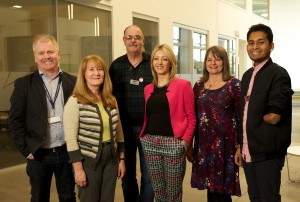Engender blog
Guest Post: #GE17 - Kirstein Rummery, Women's Equality Party
Women's representation in politics is incredibly important. Only 33.9% of Scottish MPs elected in the last Westminster General Election were women. In the run up to the 2017 General Election on June 8, we'll be hosting a series of blogs from women involved in political campaigning. Today's blog is from Kirstein Rummery, who is standing as a candidate for the Women's Equality Party in Stirling.
Content Note: Rape
Guest Post: Tackling ‘Lad Culture’ on campus
Guest blog from Anni Donaldson, the Knowledge Exchange Fellow & Project Lead at the University of Strathclyde's Equally Safe in Higher Education project. You can follow Anni, winner of the first 'The Write to End Violence Against Women Awards', on twitter.

Guest Post: Protection from harassment in the civil courts
Guest post by Jennifer Dalziel, solicitor for the Scottish Women's Rights Centre.
Roosh V, and how we respond to hatred towards women
This has been a good week for self-promoting controversialists who boast about the rapes they have perpetrated. It’s been an exciting week for the million plus followers of their grooming how-to sites, who have found themselves the focus of the global and Scottish media. It’s been less of a good week for the women with experience of the rape, sexual harassment, and everyday sexism that flow from their toxic notions of women’s place in the world.
Guest Post: Why Reclaim the Night Still Matters, and Why You Should Come
Guest post from Anna Ritchie Allan, Chair of Glasgow Rape Crisis Board of Directors. This post first appeared on the Rape Crisis Glasgow blog as is published here with their permission.
Next year marks the 40th anniversary of Glasgow Rape Crisis Centre. Perhaps the women who came together in 1976 thought that this would all be sorted by now. That women and girls would be living their lives, free from sexual violence.
And yet here we are, still living with the everyday threat, or reality, of rape and sexual assault. Still fighting a culture which blames women for being raped, and which normalises violence against women. Still challenging the notion of ‘stranger danger’, when the vast majority of women are raped or sexually assaulted by someone they know. Still trying to change a criminal justice system that is failing to provide justice to survivors.
Downloads
 Engender Briefing: Pension Credit Entitlement Changes
From 15 May 2019, new changes will be introduced which will require couples where one partner has reached state pension age and one has not (‘mixed age couples’) to claim universal credit (UC) instead of Pension Credit.
Engender Briefing: Pension Credit Entitlement Changes
From 15 May 2019, new changes will be introduced which will require couples where one partner has reached state pension age and one has not (‘mixed age couples’) to claim universal credit (UC) instead of Pension Credit.
 Engender Parliamentary Briefing: Condemnation of Misogyny, Racism, Harassment and Sexism
Engender welcomes this Scottish Parliament Debate on Condemnation of Misogyny, Racism, Harassment and Sexism and the opportunity to raise awareness of the ways in which women in Scotland’s inequality contributes to gender-based violence.
Engender Parliamentary Briefing: Condemnation of Misogyny, Racism, Harassment and Sexism
Engender welcomes this Scottish Parliament Debate on Condemnation of Misogyny, Racism, Harassment and Sexism and the opportunity to raise awareness of the ways in which women in Scotland’s inequality contributes to gender-based violence.
 Gender Matters in Social Security: Individual Payments of Universal Credit
A paper calling on the Scottish Government to automatically split payments of Universal Credit between couples, once this power is devolved to the Scottish Parliament.
Gender Matters in Social Security: Individual Payments of Universal Credit
A paper calling on the Scottish Government to automatically split payments of Universal Credit between couples, once this power is devolved to the Scottish Parliament.
 Gender Matters Manifesto: Twenty for 2016
This manifesto sets out measures that, with political will, can be taken over the next parliamentary term in pursuit of these goals.
Gender Matters Manifesto: Twenty for 2016
This manifesto sets out measures that, with political will, can be taken over the next parliamentary term in pursuit of these goals.
 Scottish NGO Briefing for UN Special Rapporteur on Violence Against Women
Joint briefing paper for the UN Rapporteur on Violence Against Women.
Scottish NGO Briefing for UN Special Rapporteur on Violence Against Women
Joint briefing paper for the UN Rapporteur on Violence Against Women.

Newsletter
Sign up to receive our newsletter here:
Sign up to our mailing list
Receive key feminist updates direct to your inbox: